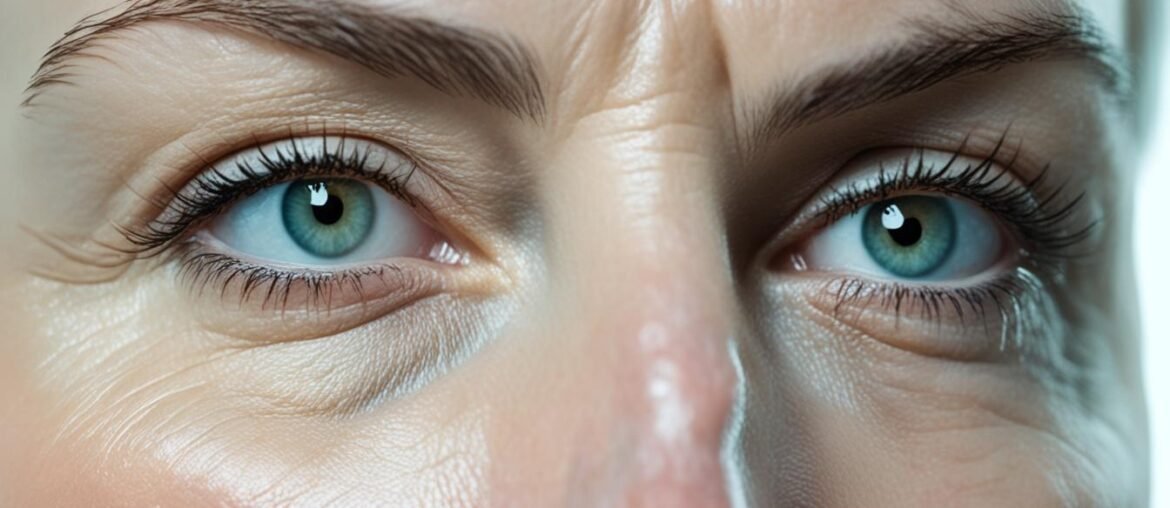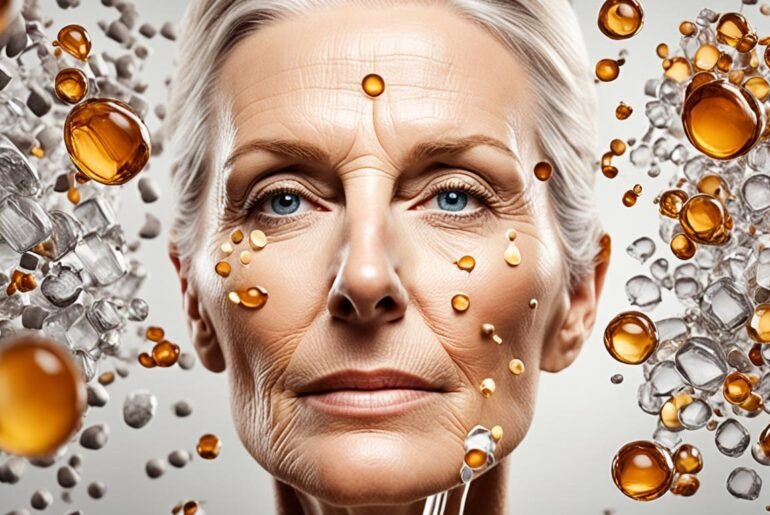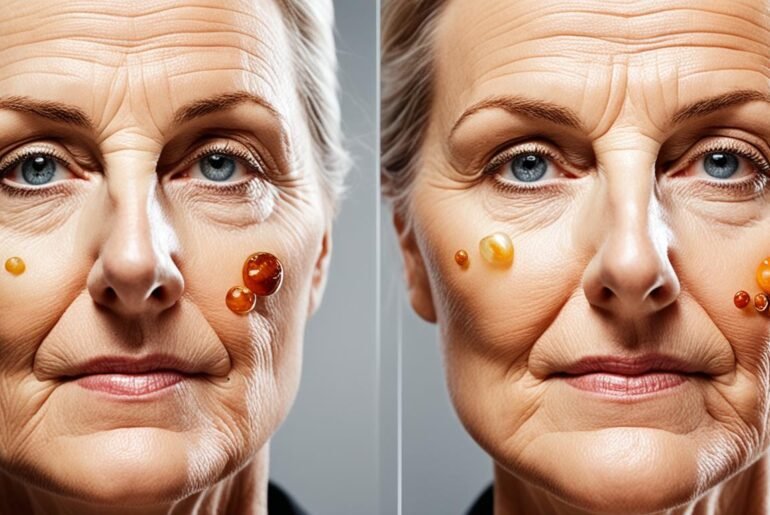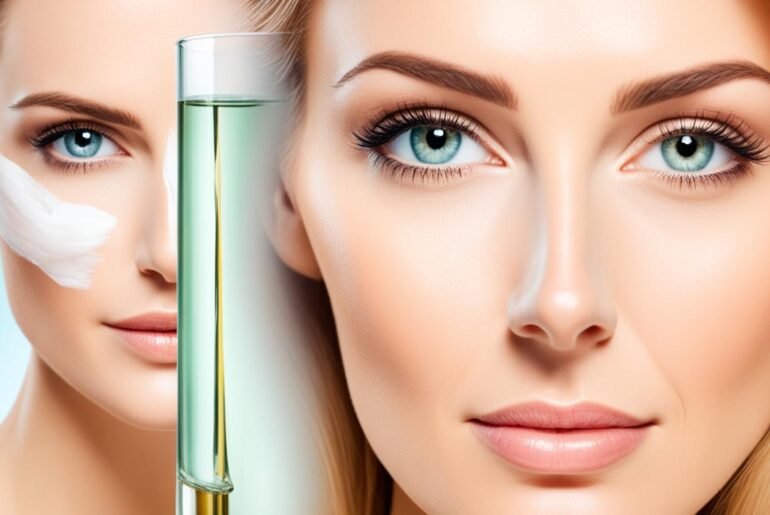Did you know that the effects of alcohol extend beyond a night of revelry? Alcohol can wreak havoc on your skin, leading to dehydration, inflammation, and accelerated aging. Yes, those late-night drinks could be taking a toll on your skin’s health and appearance. In this article, I will explore the link between alcohol consumption and skin damage, as well as provide anti-aging solutions to reverse the effects.
Key Takeaways:
- Alcohol consumption can cause dehydration, inflammation, and accelerated aging of the skin.
- Heavy alcohol use is associated with increased severity of facial lines, puffiness, and volume loss.
- Alcohol dehydrates the skin, leading to dryness, cracking, and an increased risk of whiteheads and blackheads.
- Hydration, skincare routine, lifestyle changes, and professional help are essential in repairing alcohol-damaged skin.
- Reducing alcohol consumption and using alcohol-free skincare products can protect and improve skin health.
The Effects of Alcohol on the Skin
Alcohol is classified as one of the worst compounds to destroy the skin. It dehydrates the skin, leading to visible signs of dehydration such as wrinkles. Additionally, alcohol causes inflammation, which can result in facial redness and flushing. The long-term effects of alcohol consumption can accelerate the aging process, making the skin appear older and more damaged.
Alcohol-induced dehydration is a common side effect of excessive alcohol consumption. When alcohol enters the body, it acts as a diuretic, increasing urine production and leading to fluid loss. This dehydration can significantly impact the skin’s appearance and health, resulting in dryness, tightness, and dullness.
In addition to dehydration, alcohol can also cause inflammation in the skin. When alcohol is metabolized in the body, it produces toxic byproducts that can trigger an inflammatory response. This inflammation can manifest as facial redness, flushing, and even acne breakouts.
Furthermore, the long-term effects of alcohol on the skin can contribute to accelerated aging. Alcohol-related inflammation and dehydration can impair the skin’s natural repair processes, leading to a breakdown of collagen and elastin fibers. These structural proteins are crucial for maintaining the skin’s firmness and elasticity, and their decline can result in the development of fine lines, wrinkles, and sagging skin.
It is important to note that alcohol-induced skin damage is not limited to those who consume excessive amounts of alcohol. Even moderate alcohol consumption can have a detrimental impact on the skin over time. Therefore, it is essential to be mindful of alcohol’s effects on the skin and take steps to mitigate these risks.
To protect your skin from the damaging effects of alcohol, it is advisable to limit alcohol consumption and opt for moderation. Additionally, incorporating a comprehensive skincare routine that focuses on hydration, anti-inflammatory ingredients, and antioxidant-rich products can help counteract the negative effects of alcohol. Regularly using sunscreen, practicing good sleep hygiene, and maintaining a healthy lifestyle with a balanced diet and regular exercise are also crucial for maintaining optimal skin health.
By understanding and addressing the effects of alcohol on the skin, individuals can take proactive steps to protect and improve their skin’s appearance and overall health.
Alcohol-Related Skin Aging
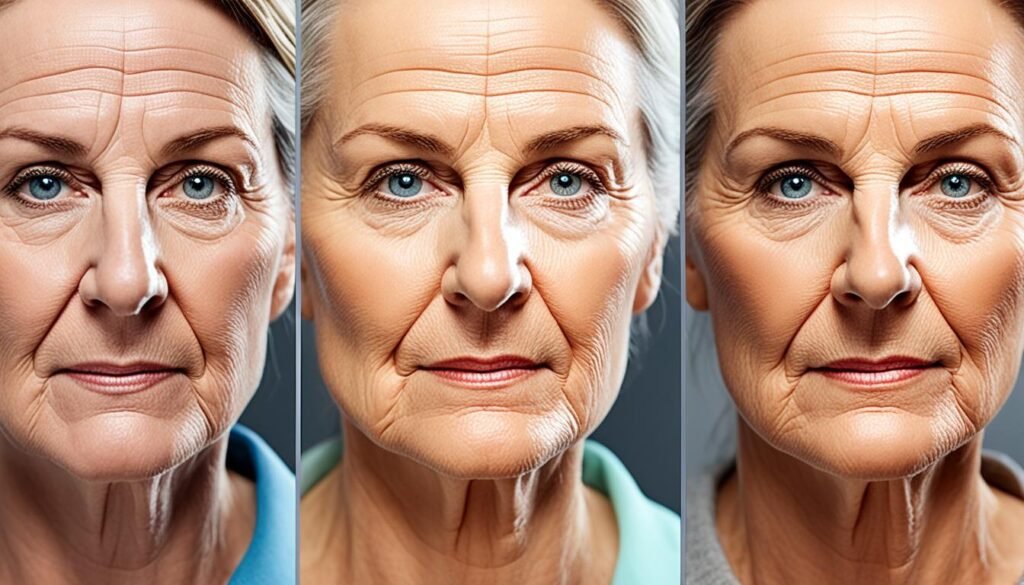
Research suggests that alcohol consumption can contribute to the aging of the skin. Heavy alcohol use can result in the development of facial lines, under-eye puffiness, oral commissures, and mid-face volume loss. Additionally, smoking and alcohol consumption have been linked to the increased severity of forehead lines, crow’s feet, glabellar lines, tear-trough hollowing, and nasolabial folds. These signs of alcohol-related aging can make the skin appear older and more damaged over time.
“Alcohol consumption can accelerate the aging process of the skin by causing dehydration, inflammation, and collagen breakdown. These effects can manifest as wrinkles, sagging skin, and loss of elasticity.”
Alcohol-related skin aging is a result of several factors. Firstly, alcohol is a diuretic, leading to dehydration that impacts the skin’s moisture levels and contributes to the formation of wrinkles and fine lines. Secondly, alcohol causes inflammation, which can damage skin cells and disrupt collagen production, resulting in the loss of firmness and elasticity.
To better understand the impact of alcohol on skin aging, let’s take a closer look at some of the specific signs of alcohol-induced aging:
Facial Lines
The consumption of alcohol has been associated with the increased severity of facial lines. These lines may appear more pronounced and deeper due to the repetitive muscle movements associated with facial expressions coupled with the skin’s decreased ability to bounce back and recover from damage.
Under-Eye Puffiness
Alcohol consumption can lead to under-eye puffiness, commonly known as bags under the eyes. The diuretic effect of alcohol causes fluid retention, resulting in the swelling of the delicate skin under the eyes.
Oral Commissures
Oral commissures are the corners of the mouth, and heavy alcohol use can exacerbate the appearance of deep lines and wrinkles in this area. These lines can contribute to a sad or aged expression.
Midface Volume Loss
The midface refers to the cheeks and the area below the eyes. Alcohol consumption has been associated with midface volume loss, which can cause the cheeks to appear hollow and sunken, adding to an overall aged appearance.
To visualize the signs of alcohol-related aging, refer to the following table:
| Signs of Alcohol-Related Aging | Description |
|---|---|
| Facial Lines | Increased severity of facial lines |
| Under-Eye Puffiness | Fluid retention leading to puffiness under the eyes |
| Oral Commissures | Deep lines and wrinkles in the corners of the mouth |
| Midface Volume Loss | Loss of volume in the cheeks and below the eyes |
Understanding the effects of alcohol on the aging process of the skin is essential for individuals who wish to minimize the signs of alcohol-induced skin damage. By reducing alcohol consumption and adopting a comprehensive skincare routine, one can mitigate the effects of alcohol-related aging and maintain a healthier and more youthful-looking complexion.
The Link between Alcohol and Dehydration
Alcohol-induced dehydration can have significant effects on the skin’s hydration levels and barrier function. When the body, including the skin, lacks sufficient moisture, it can result in dryness, cracking, and scaling of the skin. Furthermore, dehydration can enlarge pores and increase the likelihood of developing whiteheads and blackheads.
The skin’s barrier function, which plays a crucial role in protecting against external aggressors, can become compromised due to alcohol-induced dehydration. This compromised barrier function makes the skin more susceptible to damage, infection, and premature aging.
It is essential to understand the impact of alcohol on skin hydration and the skin barrier to effectively address and prevent alcohol-related skin damage. By maintaining proper hydration levels and supporting the skin’s natural barrier function, individuals can help protect their skin from the detrimental effects of alcohol consumption.
Here is an image illustrating the effects of alcohol-induced dehydration on the skin:
| Effects of Alcohol-Induced Dehydration on the Skin |
|---|
| Dryness, cracking, and scaling of the skin |
| Enlarged pores |
| Increased risk of whiteheads and blackheads |
| Compromised skin barrier function |
| Greater susceptibility to damage, infection, and premature aging |
Repairing Alcohol-Damaged Skin
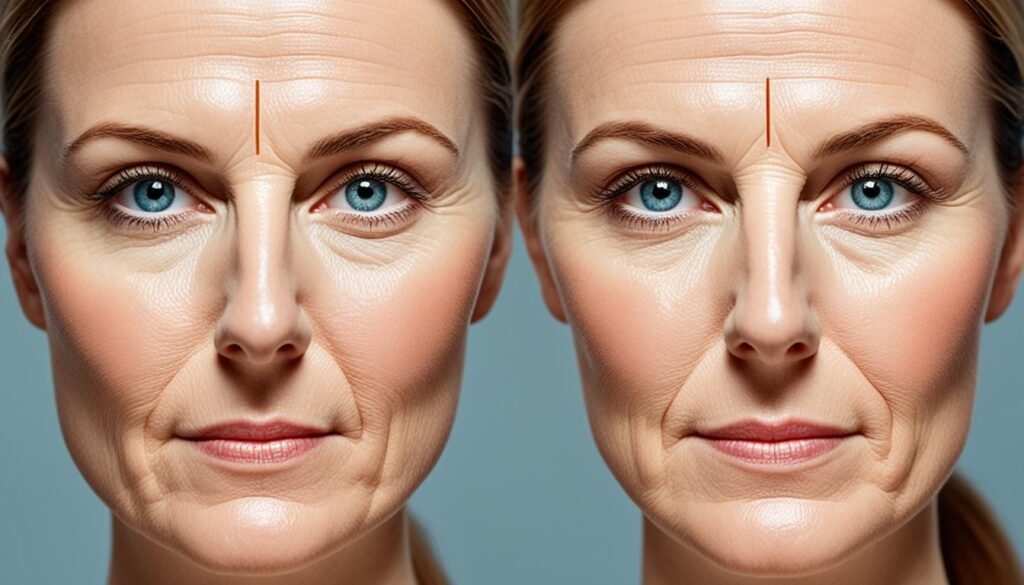
To repair alcohol-damaged skin, hydration is key. Drinking plenty of water and using hydrating skincare products can help replenish moisture and restore the skin’s barrier function. Regular exercise can also increase blood flow to the skin, promoting a healthy complexion. Adding supplements like vitamin A, biotin, and other vitamins can support skin regeneration and overall skin health. Additionally, incorporating a skincare routine with cleansing and moisturizing can prevent and reverse existing damage.
Hydration is essential for repairing skin damaged by alcohol. The skin loses a significant amount of moisture due to alcohol consumption, resulting in dryness and dullness. Drinking an adequate amount of water throughout the day helps to rehydrate the skin from within.
Using hydrating skincare products is another effective way to repair alcohol-damaged skin. Look for moisturizers and serums that contain ingredients like hyaluronic acid, glycerin, and ceramides, which help to lock in moisture and restore the skin’s natural hydration levels.
Exercise not only benefits overall health but also promotes a healthy complexion. Regular physical activity increases blood flow to the skin, delivering essential nutrients and oxygen, which can aid in the repair and rejuvenation of alcohol-damaged skin.
Vitamin A, biotin, and other vitamins play a crucial role in skin health and regeneration. These nutrients help support collagen production, improve skin elasticity, and promote cell turnover, leading to smoother and healthier-looking skin. Adding a targeted supplement or incorporating foods rich in these vitamins into your diet can provide an extra boost for repairing alcohol-induced skin damage.
A proper skincare routine is essential for repairing and preventing further damage to alcohol-damaged skin. Start with a gentle cleanser to remove impurities and buildup. Follow up with a nourishing moisturizer to hydrate and protect the skin. Don’t forget to apply sunscreen as well to shield your skin from harmful UV rays and prevent further damage.
Lifestyle Changes for Skin Health
Reducing alcohol consumption can significantly improve the health and appearance of your skin. But it’s not just about cutting back on alcohol; incorporating specific lifestyle changes can further enhance your skin’s well-being. Here are some tips to consider:
- Opt for Alcohol-Free Skincare: Switching to alcohol-free skincare products can help minimize the negative effects of alcohol on your skin. Look for products labeled “alcohol-free” to avoid drying out your skin and exacerbating any existing issues.
- Embrace Sober Beauty Tweaks: Explore non-alcoholic alternatives and sober beauty tweaks to enjoy a fun and hydrating experience without compromising your skin’s health. One option is to indulge in mocktails instead of alcoholic drinks. Not only will you stay hydrated, but your skin will thank you.
- Try Non-Alcoholic Alternatives: When it comes to skincare, there are plenty of non-alcoholic alternatives available. Look for toners, serums, and moisturizers that are alcohol-free. These products can provide the nourishment and hydration your skin needs without the harmful effects of alcohol.
By implementing these lifestyle changes, you can protect your skin from alcohol-induced damage and promote its overall health. Remember, alcohol-free skincare and non-alcoholic alternatives are key to achieving the healthy, glowing complexion you desire.
The Benefits of Alcohol-Free Skincare
Alcohol-free skincare products offer several advantages over their alcohol-containing counterparts. Here are some benefits:
“Alcohol-free skincare helps to maintain the skin’s natural moisture balance, preventing dryness and dehydration. It also reduces the risk of irritation, inflammation, and sensitivity, allowing for a healthier complexion.”
Using alcohol-free beauty products ensures that your skin receives the necessary hydration and nutrients without stripping it of its natural oils. It’s a simple yet effective way to keep your skin happy and healthy.
| Alcohol-Free Skincare Benefits | Alcohol-Containing Skincare Risks |
|---|---|
|
|
Additional Tips for Skin Repair
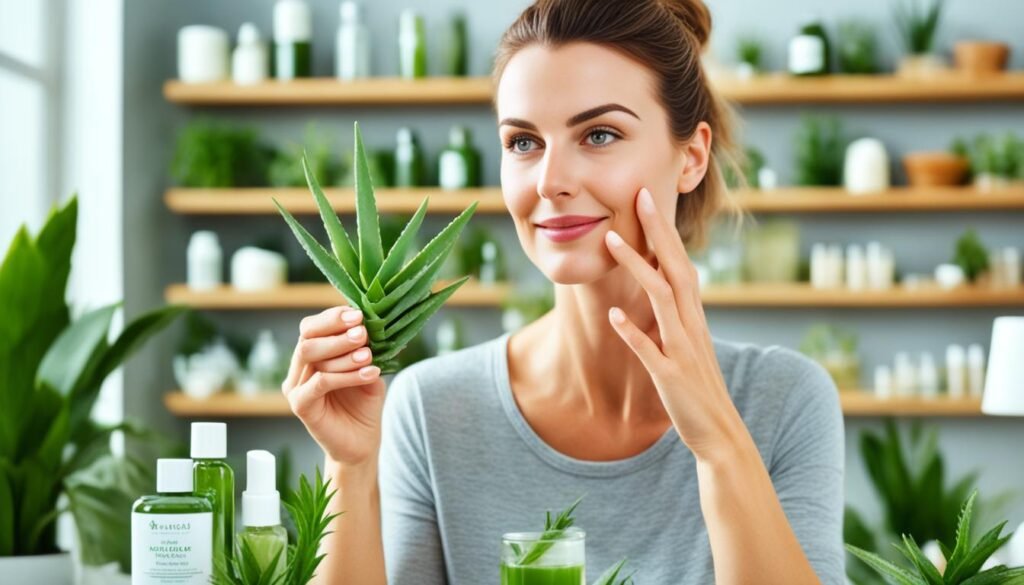
In addition to hydrating your skin and making lifestyle changes, there are other tips you can follow to repair alcohol-damaged skin and promote skin health. Incorporating these tips into your skincare routine can bring about positive changes and help restore your skin’s natural beauty.
Elevate Your Head While Sleeping
One simple yet effective tip is to elevate your head while sleeping. This can help reduce eye and face puffiness, which are common signs of alcohol-induced skin damage. By sleeping with an extra pillow or using a wedge pillow, you can encourage better lymphatic drainage and minimize fluid retention in the facial area.
Switch to a Silk Pillowcase
Avoid tugging and pulling on your skin by switching to a silk pillowcase. Unlike cotton or other fabrics, silk is smoother and causes less friction against your skin. This can help prevent the formation of wrinkles and ensure your skin stays smooth and youthful even during sleep.
Protect Your Skin with Daily Sunscreen
Sunscreen is an essential part of any skincare routine, especially when repairing alcohol-damaged skin. Alcohol can make your skin more sensitive to the sun’s harmful UV rays, increasing the risk of sunburn and further damage. Apply a broad-spectrum sunscreen with at least SPF 30 every day, even on cloudy days, to shield your skin from UV damage and maintain its health and appearance.
Establish a Consistent Skincare Routine
Consistency is key when it comes to repairing and maintaining healthy skin. Establishing a skincare routine that includes cleansing and moisturizing is essential. Choose gentle cleansers that won’t strip away natural oils from your skin, and opt for moisturizers that provide hydration and nourishment. Add in targeted serums or treatments to address specific concerns, such as fine lines or uneven skin tone.
Incorporating these tips into your daily skincare routine can help repair alcohol-damaged skin and improve its overall health. By taking care of your skin and making conscious choices, you can restore its natural beauty and promote a youthful, radiant complexion.
The Importance of Seeking Help for Alcohol Abuse

Alcohol abuse can have severe consequences that extend far beyond skin damage. It can lead to physical dependence, liver disease, heart disease, relationship problems, and more. Recognizing the need for professional help is crucial in overcoming alcohol addiction and addressing the underlying issues that contribute to it.
“Alcohol abuse not only affects the individual but also their loved ones. Seeking professional help is essential for a successful recovery.”
When it comes to alcohol addiction, it is vital to understand that it is not a matter of willpower or self-control. Professional help, such as alcohol detox and addiction treatment, provides individuals with the necessary support, guidance, and resources to overcome their addiction and achieve long-term sobriety.
The Benefits of Alcohol Detox
- Safe and supervised medical detoxification to manage withdrawal symptoms
- 24/7 monitoring and medical care to ensure physical well-being
- Supportive environment for individuals to break the cycle of addiction
- Access to medical professionals experienced in alcohol addiction treatment
Professional Alcohol Addiction Treatment
Alcohol addiction treatment involves various therapeutic approaches tailored to the individual’s needs. It aims to address the physical, emotional, and psychological aspects of addiction, helping individuals understand the root causes of their alcohol abuse and develop healthy coping mechanisms.
Effective alcohol addiction treatment may include:
- Individual counseling to explore underlying issues and develop personalized strategies for recovery
- Group therapy to provide support, encouragement, and a sense of community
- Family therapy to mend relationships and rebuild trust
- Educational programs to enhance understanding of addiction and relapse prevention
- Aftercare planning to support individuals in maintaining sobriety beyond treatment
By seeking professional help for alcohol addiction, individuals can embark on a journey of recovery, reclaim their lives, and find freedom from the devastating effects of alcohol abuse.
Remember, you don’t have to face alcohol addiction alone. Reach out to a trusted treatment center or healthcare professional today to take the first step towards a healthier, happier future.
How Clearbrook Treatment Centers Can Help
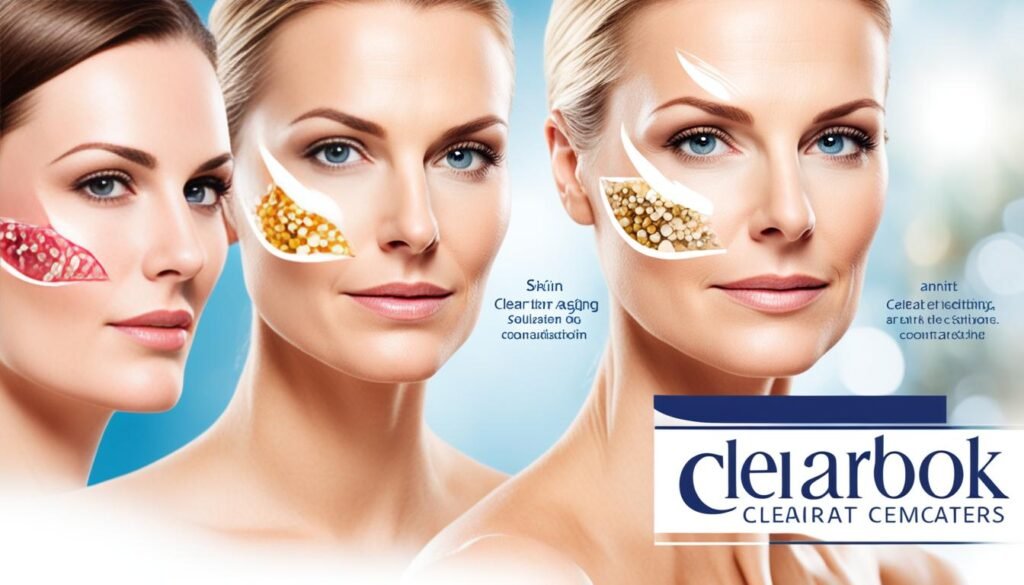
Clearbrook Treatment Centers provides comprehensive alcohol detox and addiction treatment programs designed to help individuals overcome their alcohol addiction and embark on the path to recovery. With a focus on safety, well-being, and long-term success, Clearbrook offers a range of services to support clients throughout their journey.
At Clearbrook, our medically led detox program ensures that clients can safely navigate the withdrawal process under the supervision of experienced medical professionals. This critical first step allows individuals to cleanse their bodies from alcohol and begin the healing process.
In addition to detoxification, Clearbrook’s treatment approach includes various forms of therapy to address the emotional and psychological aspects of addiction. Individual counseling, group therapy, and family therapy are all integral components of our comprehensive treatment model, providing clients with the support and tools they need to achieve lasting recovery.
Seeking professional help for alcohol addiction can be a pivotal step towards recovery and a healthier, happier life. By choosing Clearbrook Treatment Centers, individuals can access evidence-based treatment programs and specialized care tailored to their unique circumstances.
Clearbrook Treatment Centers is dedicated to helping individuals rebuild their lives and find freedom from alcohol abuse. With a team of compassionate professionals and a complete range of services, we are committed to supporting each client’s journey towards recovery.
If you or someone you know is struggling with alcohol addiction, don’t hesitate to reach out for help. Clearbrook Treatment Centers is here to provide the support and guidance needed to overcome addiction and reclaim a fulfilling life.
Conclusion
Alcohol consumption can have detrimental effects on the skin, including dehydration, inflammation, and accelerated aging. To reverse alcohol skin damage and promote anti-aging, it is crucial to adopt a comprehensive skincare routine and make necessary lifestyle changes. Incorporating hydration through drinking ample water and using moisturizing skincare products can help replenish moisture and restore the skin’s barrier function. Additionally, reducing alcohol consumption can minimize the negative effects on the skin and improve overall skin health.
Seeking professional help for alcohol addiction is also vital for addressing the underlying issues contributing to alcohol abuse and achieving long-term recovery. It is essential to recognize that alcohol abuse can have severe consequences beyond skin damage, including physical and mental health issues. Clearbrook Treatment Centers offers alcohol detox and addiction treatment programs that provide the necessary support and therapies for individuals to overcome their alcohol addiction and take steps towards a healthier and more fulfilling life.
By prioritizing skincare, hydration, and seeking professional help when needed, individuals can effectively reverse alcohol skin damage, find anti-aging solutions, and improve their overall wellbeing. Remember, taking care of your skin goes beyond aesthetics – it is an investment in your health and self-care journey.
FAQ
What are the effects of alcohol on the skin?
Alcohol can dehydrate the skin, cause inflammation, and accelerate the aging process, leading to wrinkles and damage.
How does alcohol contribute to skin aging?
Alcohol consumption is associated with increased severity of facial lines, sagging, and volume loss, making the skin appear older and damaged.
How does alcohol affect skin hydration?
Alcohol dehydrates the skin, leading to dryness, cracking, and enlarged pores, compromising the skin’s barrier function and increasing the risk of damage and premature aging.
How can I repair alcohol-damaged skin?
Hydration is key. Drink plenty of water, use hydrating skincare products, exercise regularly, and consider adding skin-supporting supplements to your routine.
What lifestyle changes can improve skin health?
Reduce alcohol consumption, opt for alcohol-free skincare products, and explore non-alcoholic alternatives for a hydrating experience.
Any additional tips for repairing alcohol-damaged skin?
Elevate your head while sleeping, use a silk pillowcase, wear sunscreen daily, and establish a consistent skincare routine with cleansing and moisturizing.
Why is it important to seek help for alcohol abuse?
Alcohol abuse can have severe consequences beyond skin damage, including physical dependence, liver disease, heart disease, and relationship problems.
How can Clearbrook Treatment Centers help individuals with alcohol addiction?
Clearbrook Treatment Centers offer alcohol detox and addiction treatment programs, providing medical support and comprehensive therapy to achieve long-term recovery from alcohol abuse.
Are natural remedies available for alcohol-induced skin damage?
Yes, adopting a skincare routine with natural and hydrating products can help repair and improve the skin damaged by alcohol.
By following anti-aging solutions, such as reducing alcohol consumption and adopting a skincare routine, you can reverse alcohol-related skin aging and improve overall skin health.

